Canada Blacklists More Iranian Officials, Including Ex-FM Zarif
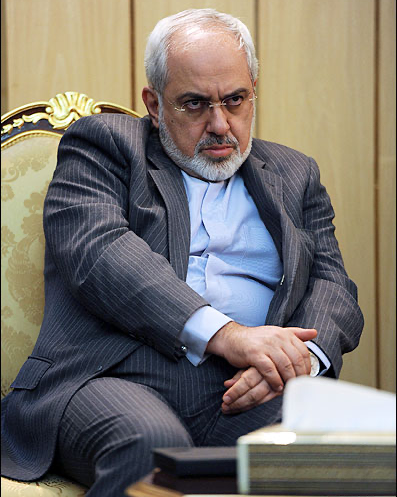
Canada imposed a new set of sanctions against 17 Iranian individuals and three entities that have participated in or enabled gross human rights violations.

Canada imposed a new set of sanctions against 17 Iranian individuals and three entities that have participated in or enabled gross human rights violations.
The foreign ministry said in a statement on Thursday that additional sanctions were imposed under the Special Economic Measures Regulations in response to the government's human rights abuses and destabilizing actions.
Former Iranian Foreign Minister Javad Zarif was in the new list as well as former prosecutor Saeed Mortazavi, Khamenei's representative in Kayhan Hossein Shariatmadari, former president Hassan Rouhani's defense minister Amir Hatami, the current state broadcaster chief Peyman Jebelli and former parliament speaker Ali Larijani.
Canadian Foreign Minister Melanie Joly said, “The actions of the Iranian regime speak for themselves – the world has watched for years as it has pursued its agenda of violence, fear and propaganda," adding that "Canada will continue to defend human rights and we will continue to stand in solidarity with the Iranian people, including women and youth, who are courageously demanding a future where their human rights will be fully respected."
On October 3, Canada slapped sanctions on 34 Iranian officials and entities, including the Islamic Revolutionary Guard Corps (IRGC) and morality police, over the crackdown on current protests, sparked by the death of Mahsa Amini, a 22-year-old Iranian Kurdish woman who died while in custody of Iran's "morality” police.

Antigovernment protests in Iran are in their fourth week but the movement which many now refer to as a revolution has not yet found a leader the majority can trust.
Since the early days of the Islamic Republic, the clerical leadership has consistently eliminated political parties, free media, and anyone who could possibly be in a position to lead the opposition. This has manifested itself in the biggest characteristic of the current movement which is spontaneous and has no leader.
Some pundits warn that without a leadership the movement which has chosen “Women, Life, Liberty” as its motto may fail to achieve its goal of overthrowing the Islamic Republic, and to sustain its achievement if it succeeds. Others say lacking a known leader makes it much harder for the establishment to suppress the movement.
Unlike the politically driven protests in 2009, and economic protests between 2016 and 2019, the driving force of the current movement is the people’s determination to restore their social rights by getting rid of clerical rule.
“The center of gravity of the society’s immediate demands has changed from politics to citizen’s rights,” prominent reformist theoretician Saeed Hajjarian said in an analysis published Thursday while stressing that the movement should not ignore the political playground to be able to ensure long-term irrevocability of its gains.
What appears to be uniting the protesters is dislike and even hatred of the clerical regime.
A large and fierce protest in Tehran's Nazi Abad district Wednesday night.
Protests – on the streets, in universities, and schools -- are now taking place in nearly a hundred large and small cities and towns. Despite the growth of the movement, Islamic Republic’s ruler Ali Khamenei and his officials continue to deny the authenticity of the current movement and insist that foreign “enemies” including the United States, Britain, Israel, and Saudi Arabia, are fomenting the unrest.
Authorities also insist that protesters are only a small minority. The government mouthpiece, Iran newspaper, claimed Thursday that only 80,000 have taken part in the protests across the country.
The footage that finds its way to social media despite serious Internet disruption appears to confirm their claim as these usually show smaller groups of people protesting. However, this is because protesters’ flash-mob-style tactic that confuses security forces and reduces their vulnerability to attacks by government forces.
There have been exceptions too, when thousands have gathered in one area such as the protests Saturday and Wednesday in the working-class Nazi Abad neighborhood in Tehran, where overwhelmed by the sheer numbers, security forces largely remained on the side-lines.
In the past few years ultra-hardliners, whose sway on all forces and institutions of the state was completed with the ascension of Ebrahim Raisi to presidency, have intensified social restrictions.
More interference in people’s lifestyles and popular resentment of the political and religious establishment is so bluntly felt now that even some former and current officials find themselves incapable of defending it.
“The ruling system has clearly broken into two. You can see this in officials’ remarks and attitude,” a political analyst who asked not to be named said referring to remarks by two prominent establishment figures in the past couple of days.
“What should people do if they don’t want to be led to enjoining good?” the minister of cultural heritage and tourism, Ezzatollah Zarghami, said in a tweet Tuesday referring to the Islamic concept of promoting moral goodness and forbidding evil according to Sharia. For ultra-hardliners enforcing hijab is following that edict. Former speaker Ali Larijani in remarks Wednesday in also criticized hijab policing.
Zarghami and Larijani both hail from the Revolutionary Guard (IRGC) and both have served at the helm of the Islamic Republic’s biggest propaganda machine, the state broadcaster (IRIB) for many years.
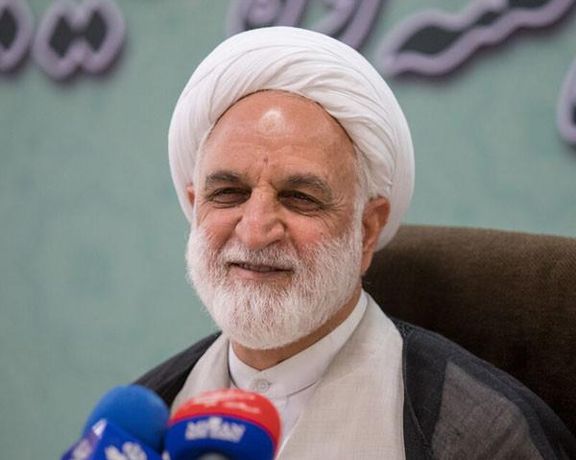
Just days after Iran's judiciary chief called for dialogue with people, he ordered judges Thursday to issue tough sentences for the "main elements of riots," ignited after the death in custody of a young woman.
Gholam-Hossein Mohseni Ejei said, "I have instructed our judges to avoid showing unnecessary sympathy to main elements of these riots and issue tough sentences for them while separating the less guilty people."
In a show of leniency on Tuesday, October 11, Ejei had said “I’m ready. Let’s talk. If we’ve made mistakes, we can amend them,” however, hardly any Iranian believed the soft tone which came for the first time in 43 years from the Islamic Republic’s authorities.
The current uprising sparked by the death of 22-year-old Mahsa Amini while in the custody of Iran's hijab or “morality” police on September 16 have turned into one of the boldest challenges to the clerical leadership since the 1979 revolution.
On Wednesday, a large number of defense attorneys and people held a protest outside Tehran Bar Association demanding fair trial for thousands of protesters arrested since mid-September. The government denies access to a lawyer for many detainees or appoints its own attorneys who follow instructions by the notorious Judiciary.
Later, a leading attorney, Saeed Dehghan was quoted as saying that three attorneys participating in the protest were detained.
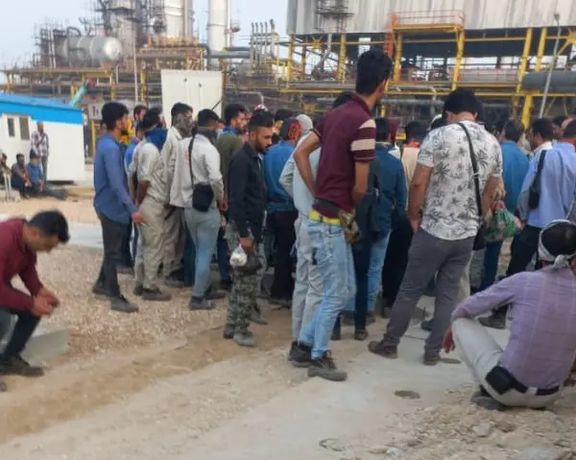
Strikes by some workers of Iran's oil and petrochemical industry entered its fourth day on Thursday, as nationwide antigovernment protests continued on daily basis.
Workers at Iran's largest refineries in southern oil-rich provinces of Bushehr, Khuzestan and Hormozgan such as Abadan Refinery and the petrochemical workers in Asalouyeh, off the coast of the Persian Gulf have been on strikes since Monday.
According to reports on Thursday the workers are under pressure to break their strikes with dozens of them arrested and the rest threatened to be fired while their internet access has been cut off.
A union for the oil workers released a statement on Thursday saying that 30 of their colleagues have been detained and security forces are rushing from nearby regions to crack down on the protesters who demand the release of their coworkers.
In their statement, they said they will respond to the crackdown with strikes in more plants and they would not come back to work until the government’s heavy-handed clampdown on Iranians stops.
They also called on all industrial workers to join their protest.
A report received on Wednesday said strikers have blocked some highways linking oil and petrochemical plants in southern Iran to prevent security forces from traveling to hotspots where workers are on strike or are protesting.
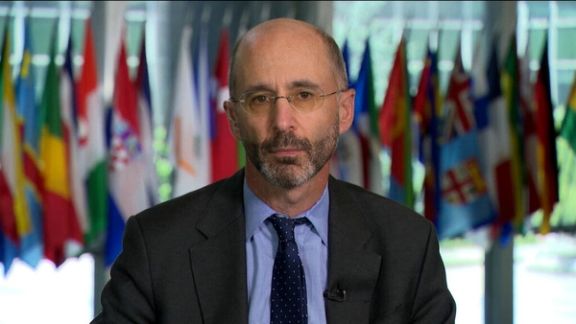
The US State Department said Wednesday that the Iran nuclear deal is “not our focus right now” amid popular protests, but it has done little to help Iranians.
The reality was apparent during department spokesperson Ned Price’s Wednesday briefing, where reporters kept pressing him over the lack of progress in helping Iranians to get access to the Internet that the government blocks during protests to stifle the free flow of information.
As nationwide protests began Wednesday in Iran, the government shut down most Internet access in major cities. Washington reporters were aware of that and pressed Mr. Price for answers.
The fact is that there is very little the Administration or US technology companies can do to help connect Iranians to the Internet, at least in the near future. There are two major reasons for this.
First, gateways to Internet traffic are controlled by the government and if it decides to shut off mobile data connection or even home landlines during protests, there is hardly anything foreign entities can do to help.
Second, even if the Administration removes all impediments for US companies to sell software and hardware to Iranians, it would be an extremely difficult task to bypass Iranian government controls.
The Islamic Republic is an authoritarian regime, with 80 percent of the economy controlled by the government and the concept of business freedom is almost non-existent, except at some retail level. The government tightly controls all imports. That would block any attempt to export hardware to Iran.
In terms of software, most Iranians do not have the resources or the banking means to purchase a license from a foreign source or download software they need to pay for.
Free software can be made accessible by US or other international companies, but if the regime really wants to make it hard, it will designate procurement of such software a criminal offense and try to block access.
Apart from these difficulties, providing access to the Internet is a relatively small issue compared with the main problem, which is the use of brutal force by the government against its people.
The US has imposed sanctions on a few individuals since the protests began, but beyond that has not acted to penalize the clerical regime, even as its leader Ali Khamenei on Wednesday called for more repression against protests.
The statement by Price that the Biden Administration is not focused on reviving the Obama-era nuclear deal, which would provide tens of billions of dollars to the repressive government, was a signal well received by Iranians on social media. But many argue that the US should impose more sanctions and enforce existing ones more rigorously to pressure Tehran.
A report by The Sun on October 12 quoted several Washington sources as saying that “there is a growing rift between officials at the treasury department, who are urging Mr. Biden to intensify sanctions in support of protesters, and Mr. Malley, the special envoy who prizes a renewal of the 2015 nuclear deal above all.”
An Iranian American community organization, NUFDI, wrote to Secretary of State Antony Blinken on October 11, asking for a major review of US Iran policy and personnel changes at the State Department, namely replacing Mr. Malley as US envoy. The group emphasized that the Administration needs an envoy to the Iranian people, not a diplomat focused on reviving the nuclear deal.
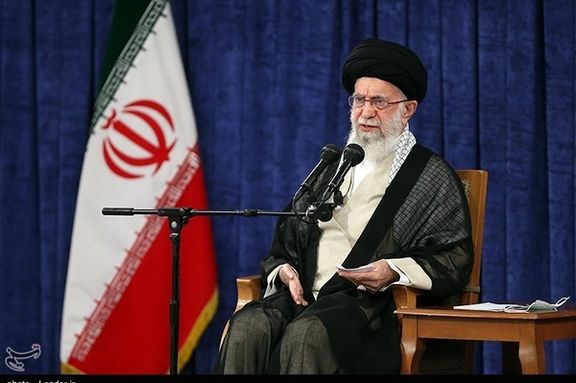
As Iran's largest uprising in four decades continued for the 25th day on Wednesday, the country’s ruler Ali Khamenei pretended to be unaffected by the upheaval.
The 83-year-old Supreme Leader in charge for 33 years called the uprising a "minor incident" although it has posed an unprecedented challenge to his rule and the very existence of the clerical regime.
Calling for harsh measures against the protesters as usual, Kahmenei charged that "Some of those in the streets these days are either the agents of the enemy or sympathize with the enemy. The Judiciary and security officials should fulfil their responsibility against these individuals. And there are still those who take to the streets because they have been provoked by others. The officials need to have some cultural plans for them."
A disconcerted Khamenei who as delivering a speech seemed to have lost his contact with reality, characterizing the uprising as "a reaction by the enemies to Iran's progress and the Iranian nation's innovations." Meanwhile he suggested that Iranian officials should resist the enemy’s plot and go about their "business as usual" regardless of "minor incidents."
While protests have been going on within less than a mile of his office like almost everywhere else in the country, Khamenei called them "scattered riots here and there." He insisted that "recent developments are not spontaneous" and blamed "the enemies’ propaganda" as the driving force of the protests. Khamenei one again charged that "foreign politicians in Europe, United States and elsewhere" have been instigating the uprising.
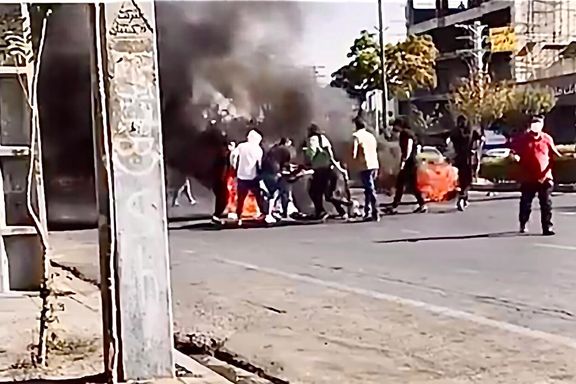
This comes while many Iranian officials and politicians as well as sociologists, economists and other academics have warned that the protests, ignited by the killing of a young woman in police custody last month, were fuelled by the government's broken promises and the people's accumulated demands and frustrations.
They have also warned that Khamenei and his regime are facing a new generation that does not care about the values imposed by the regime through morality police and other coercive institutions.
On the same day that Khamenei made the defiant remarks, Iranian reformist cleric and politician Mohammad Ali Abtahi acknowledged that "the world is listening to the voice of Iranians' protest and stressed that this voice should be also heard inside Iran."
He criticized the government for simply trying to cope with popular dissent when it manifests itself rather than trying to understand the cause of the protests. The government should have paved the way for political reforms and the creation of political parties. In the absence of political parties, the shocks created by dissidents will be directly pointed at the government, he said.
In another development, former Labor Minister Ali Rabiei warned that if the dissatisfactions are not addressed properly, dissent will remain active and sooner or later it will find its way into the streets. Rabiei who was a member of Iran's intelligence community for many years, said that crisis management is a science which should be used before, during and after every crisis.
Iranian analyst Morteza Kazemian wrote on Twitter: "Khamenei is not feeling well. He attributed the protests to the enemies, and called for confrontation with protesters." Another Twitter user, Ehsan Soltani said that "Khamenei's remarks had only one message: There will be no change. Like all dictators, he does not listen and will not correct his behavior. The only thing that can happen to them is that they can be toppled."
Former reformist MP Mahmoud Sadeghi wrote that "Khamenei's remarks destroyed any hope of a peaceful solution to the current crisis."